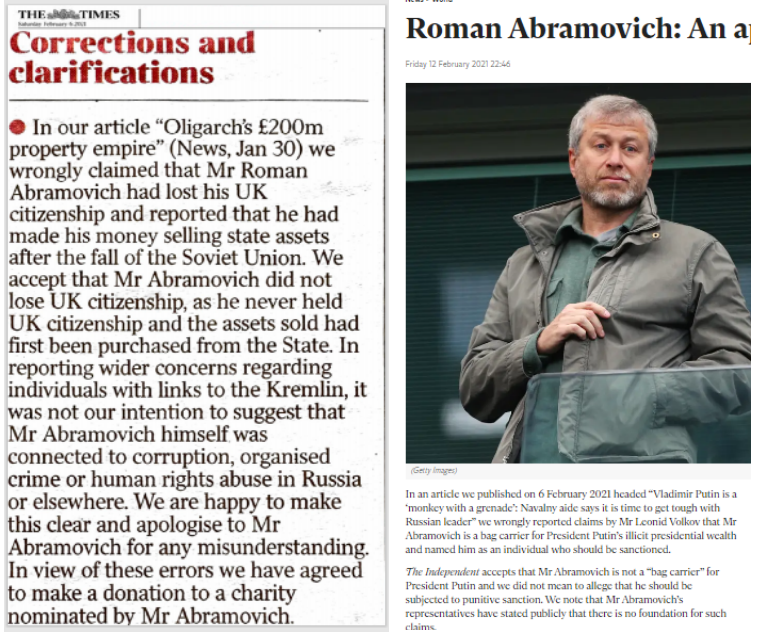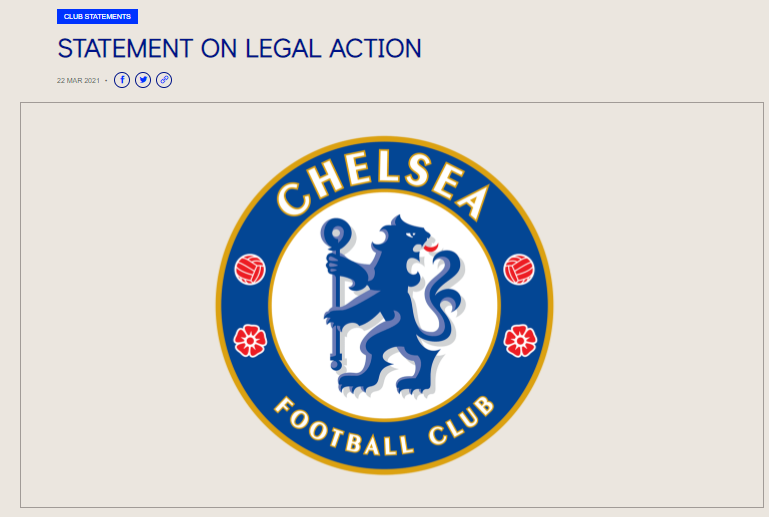

By John Helmer, Moscow
@bears_with
For the first time, the US-based international media agency Reuters is being sued for lying about Russia in the British High Court. The three defendants in the dock are Catherine Belton (lead image, right); her source, runaway bank robber Sergei Pugachev; and Rupert Murdoch’s publishing house, HarperCollins.
Roman Abramovich (left) has launched the case almost a year after Belton, Pugachev and Murdoch published a book entitled “Putin’s People: How the KGB Took Back Russia and Then Took On the West”. According to Abramovich, he has initiated the lawsuit in defence of his personal reputation and that of the Chelsea Football Club he owns. “It is my hope that today’s action will not only refute the false allegations in regard to my own name, but also serve as a reminder of Chelsea’s positive footprint in the UK.”
Belton is employed by Reuters, and the propaganda agency ran excerpts of her book last July. The book was first published in the UK on April 16, 2020; in the US on June 23, 2020.
For Reuters Belton recently set a new record for the number of anonymous sources cited to substantiate the fabrication of the Novichok case by Alexei Navalny; click to read.
Reuters is not directly named as a defendant in Abramovich’s case, according to the brief summary of the claim released by Abramovich’s London solicitors, Harbottle & Lewis, this week. Leading the law firm’s team in the case is Gerrard Tyrrell, the senior partner, John Kelly, and Louise Prince. According to Kelly’s website bio, his “personal clients include High Net Worth individuals, successful entrepreneurs, as well as leading individuals in the entertainment industry, music and sport. John has represented a host of well-known clients including the First Lady of the United States Melania Trump, Angelina Jolie, Madonna, Nicole Kidman, Steve Coogan, Russell Brand and Sharon and Ozzy Osbourne.”

Left to right: Gerrard Tyrrell, John Kelly, Louise Prince.
According to the lawyers, “we have today issued legal proceedings for defamation on behalf of our client Roman Abramovich. The legal proceedings relate to a number of false and defamatory claims made about our client in the book ‘Putin’s People’ published by HarperCollins. The book falsely alleges that our client has acted corruptly, and makes false claims about our client’s purchase, and the activities of Chelsea Football Club. Such claims are totally unacceptable and are without foundation. In view of the legal proceedings issued we will not be making a further statement at this time.”
The lawyers declined to provide a copy of the court filing; they also refused to identify the barristers who will be in court for Abramovich.
Last month Harbottle & Lewis announced that on Abramovich’s behalf, they had won three retractions and apologies for an unrelated fabrication.
On February 6, Murdoch’s The Times apologised for a January 30 report “suggest[ing] that Mr Abramovich himself was connected to corruption, organised crime or human rights abuse in Russia or elsewhere”. The wording, agreed to by Abramovich, left open the allegation that the Russian government and Putin are all of those things.
On February 12, the lawyers won this retraction from The Independent: “we wrongly reported claims by Mr Leonid Volkov [Navalny staff chief] that Mr Abramovich is a bag carrier for President Putin’s illicit presidential wealth and named him as an individual who should be sanctioned. The Independent accepts that Mr Abramovich is not a ‘bag carrier’ for President Putin and we did not mean to allege that he should be subjected to punitive sanction. We note that Mr Abramovich’s representatives have stated publicly that there is no foundation for such claims.” The newspaper, owned by the Russian couple, Alexander and Yevgeny Lebedev, settled with Abramovich after just six days.

Left: The Times, February 6, 2021. In 2009 The Times and The Sunday Times apologised and retracted for another lie about Abramovich and his football team. Abramovich continued to court for a damages award. “We wish to make it clear that neither the wording nor the positioning of the apology were agreed with either Roman Abramovich or Chelsea before publication today. The Sunday Times have been told that their actions have only aggravated the position. An application will now be made in the High Court for a Judge to assess the amount of damages and legal costs to be paid by The Sunday Times to both Roman Abramovich and Chelsea for publishing the defamatory comments and for their subsequent actions” .https://www.thetimes.co.uk/ and https://www.theshedend.com/Right: The Independent, February 12, 2021.
On February 18, a third London newspaper, Mail Online, apologised for cribbing from The Times and repeating its libel against Abramovich. “An article on 30 January 2021 headed ‘Roman Abramovich’s £200million British property empire revealed’, which was based upon a report in The Times, wrongly claimed that Mr Abramovich had lost his UK citizenship. In fact, Mr Abramovich did not lose UK citizenship, as he never held UK citizenship, and made his money selling assets purchased from the state, not state assets, when the Soviet Union broke up. We are happy to make clear that there was no intention to suggest that Mr Abramovich was an undesirable person for the purpose of UK citizenship, apologise if any contrary impression was given.”
The three newspapers announced their agreement to make a donation to a charity picked by Abramovich. They also paid Abramovich’s legal costs, his lawyers say; his charity is “fighting racism and discrimination.” It is uncertain that when Abramovich’s barrister opens his case in the High Court, he will be fighting against racism and discrimination against Russia and Russians.
Putting himself and his football club first, Abramovich has released a press statement indicating that during the year since Belton’s publication, he and his solicitors attempted to negotiate corrections and retractions, but Belton, Reuters and Murdoch refused.
“On the subject of Chelsea Football Club, in contrast to the portrayal in the book, my ambition with Chelsea Football Club has always been to create world-class teams on the pitch and to ensure the club plays a positive role in all of its communities. I believe our successes and activities over the years speak for themselves, including the trophies won, expansion of the Chelsea Academy, development of the Women’s team and the Chelsea Foundation becoming the largest charitable organisation within the Premier League. It is my hope that today’s action will not only refute the false allegations in regard to my own name, but also serve as a reminder of Chelsea’s positive footprint in the UK. I have every belief that the courts will give me a fair hearing, as they have in the past.”
That last remark is a reference to Abramovich’s victory over Boris Berezovsky in the High Court in 2012; read more.

Source: https://www.chelseafc.com/
The Financial Times, which also works with Belton, reported Abramovich’s action against her, and repeated the libel: “Tensions between the UK and Russia have intensified since the nerve agent attack on former Russian spy Sergei Skripal in the English town of Salisbury in 2018.People close to Abramovich, whose fortune is estimated at more than £10bn by the Sunday Times, have suggested a delay in processing his application for a UK visa was linked to those wider tensions.”
The FT has actively promoted the Russia lies in Belton’s book. “Her discussion of the mixture of corruption and anti-western ideology that defines Putin’s inner circle is compelling,” claimed the chief political affairs commentator called Gideon Rachman, naming the book a “must-read”. He also broadcast an interview with Belton to “discuss how the president and a coterie of close aides took over the wealth of the country on the pretext of reasserting Russia’s role on the world stage, but now find themselves without a succession plan.”
The FT’s reviewer of the book, an Oxford history don, didn’t notice a single falsehood in the book. It was “riveting”, he claimed, “It also brims with surprises, vivid details and anecdotes.”

Another of the FT’s promotion writers, reporting what he called “another incursion by Russia’s security apparatus,” has recommended “for those interested, Catherine Belton’s recent book Putin’s People explores this apparatus in excellent detail (full disclosure: Ms Belton once worked for the Financial Times).”
For the full archive of the Financial Times’ promotion of Belton’s fabrications about Russia through her association with Sergei Pugachev, Suleiman Kerimov, and Oleg Deripaska, start here. For the catalogue of lies in the book, click to open.
Belton, the book publisher and Reuters have told people familiar with the matter they will not be defending the book’s claims as truth. Instead, they will be arguing that lies in wide circulation can be reported and repeated when they concern figures and issues of public interest. War against Russia and the Novichok cases of Sergei Skripal and Alexei Navalny are lies that are defensible in print, the defendants will say.
HarperCollins has avoided the case on its website, issuing a limited statement to Reuters. It claims it will “robustly” defend “the right to report on matters of considerable public interest.” The book, HarperCollins said, “is an authoritative, important and conscientiously sourced work on contemporary Russia.”
In 2005, the libel standard for the English media was declared by the Press Complaints Commission (PCC) in a libel action I brought against The Times, Sunday Times, and HarperCollins, also on a Russian security topic. The Commission dismissed the case, ruling that publication of lies is permissible, and liars can be quoted as media sources. “In five and a half closely typed pages, the PCC said that fabrication reported in the Murdoch media as ‘speculation’ was not libel. The PCC “did not consider that it was incumbent on the newspapers to report on the background and possible motives of every person that they turned to for information. Clause 1 of the Code [of practice] does not prohibit the publication of comment and conjecture provided that they are distinguished clearly from fact.”
Belton’s source Pugachev has already been adjudicated in the High Court to be a liar and fraudster. Fleeing British arrest to live in France he cannot testify in London on Belton’s behalf. The credibility of such sources doesn’t matter, the PCC ruled fifteen years ago, so long as the source makes his lies public as his personal opinion. If the source intends to be believed for telling the truth, according to the Commission, “the material published by the newspapers could not be seen to be inaccurate…the Commission considered that the newspapers had presented conjecture and comment as such.”
For the full story of that case, read the book, Chapter 5.
So long as the subject is a Russian one — the practice of the US and British libel courts has demonstrated so far — repeating a lie often enough will erase the truth as if it had never existed.











Leave a Reply